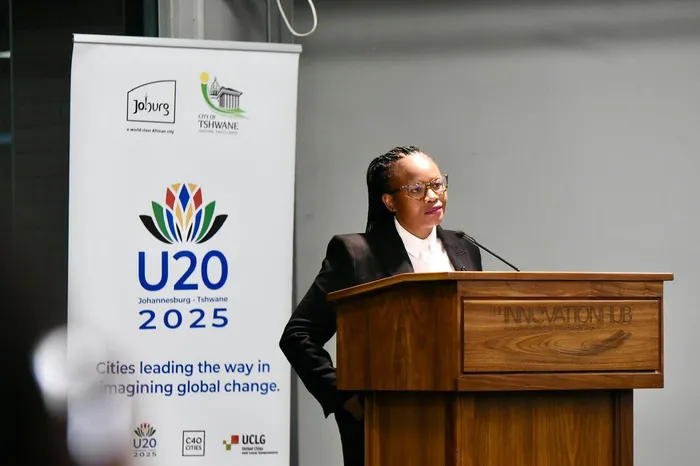Tshwane's agricultural sector calls for urgent city support to ensure food security

Tshwane Mayor Nasiphi Moya addresses a gathering of local farmers at the Innovation Hub in Pretoria during a stakeholder engagement session with the agricultural sector on Tuesday evening.
Image: Supplied / City of Tshwane
Local farmers in Tshwane, represented by the agricultural sector, urged the City of Tshwane to provide resources like tractors and land to support the farming community, aiming to boost the local economy and ensure food security in the municipality.
This transpired during a stakeholder engagement session hosted by Tshwane Mayor Nasiphi Moya at the Innovation Hub in Pretoria on Tuesday evening.
Participants agreed that collaboration between the city and the agricultural sector was necessary to effectively utilise municipal resources, support the sector, and stimulate economic growth.
Kobela Mokgohloa, chief executive officer of Korean Farms, said he had seen unused city-owned tractors and requested that these vehicles be made available to local farmers.
“If you drive on the corner of E’skia Mphahlele and Francis Baard, there are over 20 tractors that are growing grass in between them, and these tractors are unused, and we all know what a tractor means to a farmer. A tractor creates jobs, increases productivity, and also unleashes new potential. I urge the city to release these tractors into capable hands that will not only boost farming but also create a secondary income stream that will benefit the wider community,” he said.
Francois Knowles, of the Agricultural Produce Agents Council, emphasised that the city should prioritise food safety at its Tshwane Fresh Produce Market by improving maintenance to attract more business.
“How can it be that it is not a clean facility, as it is supposed to be a platform where we sell food that we consume? This is not bashing. This is a kind of assistance that all the role players who are involved and everybody contribute to. We are providing food, and so it has to be safe, and if it is not so, we are losing credibility,” he said.
Moya informed the audience about Tshwane's Economic Revitalisation Strategy, highlighting that agriculture and agri-processing are the administration's second priority, underscoring the sector's importance in achieving the goal of 3.9% economic growth by 2029.
She remarked that the meeting provided valuable insight into Tshwane's agriculture sector and emphasised her administration's commitment to strengthening partnerships with the sector.
She mentioned that the city has drafted an agriculture strategy, which is set to be approved by the Mayoral Committee (Mayco) within two months.
“In the two months, the sector must be consulted on the strategy so that when it is approved by Mayco, it is a shared vision of the sector,” she said.
Regarding city-owned resources, Moya said: “We have land and it belongs to the city, and before you know it, it is invaded and MMC (Human Settlements) Aaron Maluleka must get rid of shacks there. Why are we not releasing land to farmers so that they can help with food security?
“One of the things we have been emphasising as the municipality is that people must not develop feelings for assets of the city. Assets of the city belong to the people of Tshwane and no one else.”
Member of the Mayoral Committee for Finance Eugene Modise said for the 2025/26 financial year, the city allocated R23.9 million to the Agricultural Department, with a specific budget of R674,297 earmarked for initiatives like farmer training and poultry house refurbishment.
rapula.moatshe@inl.co.za
